$1,500 each
Frequently Asked Questions
Frequently Asked Questions
The Government has announced to defer the implementation of municipal solid waste charging (MSW charging) and will commence a series of measures including enhancing recycling facilities, stepping up public education and promotion, as well as studying how to improve the MSW charging scheme. The Government will assess the readiness of society and the implementation of the measures, with a view to reporting work progress to the Legislative Council towards mid-2025.
The applicable charging mode depends on the waste collection arrangements of the relevant premises.
There are two charging modes, i.e. (i) "charging by designated bags/ designated labels", and (ii) "charging by weight through "gate-fee".
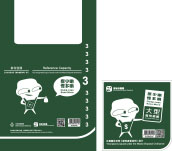
(i) charging by designated bags/ designated labels
In general, "charging by designated bags/ designated labels" is applicable to most residential buildings, commercial and industrial buildings, village houses, street-level shops and institutional premises, etc. Members of public in the relevant premises are required to wrap their waste properly in designated bags or affix a designated label on it before disposing of it at the communal waste reception areas of relevant premises as well as the refuse collection points (RCPs) of the FEHD (including bin sites).
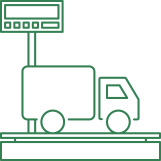
(ii) charging by weight through "gate-fee"
"Charging by weight through "gate-fee"" is mainly applicable to oversized waste or waste which is irregular in shape from commercial and industrial premises. When such waste is disposed of at the refuse transfer stations and landfills, a “gate-fee” will be charged based on its weight.
How to charge?
After the implementation of MSW charging, members of the public are required to wrap their waste properly in designated bags or affix a designated label on it before disposal at the following locations.
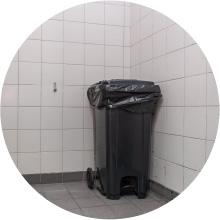
Communal waste reception areas in premises
*Only applicable to charging by designated bags/ designated labels
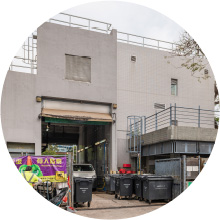
FEHD's refuse collection points (RCPs)
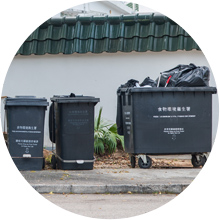
FEHD's bin sites
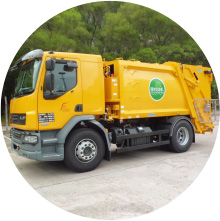
FEHD or its contractors' refuse collection vehicles (RCVs)
(including RCVs with or without rear compactors)
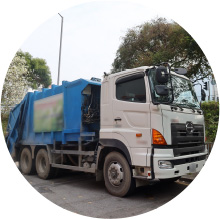
Private waste collectors (PWCs)’ RCVs with rear compactors
Waste collected by RCVs without rear compactors will be charged by weight through "gate-fee" and thus is not required to be either wrapped in designated bags or affixed with a designated label; otherwise it would lead to double payment.
Under "charging by designated bags/ designated labels", communal waste reception areas refer to common areas of any premises where waste is to be removed from the premises for disposal.
The communal waste reception areas in premises are enforcement points under the relevant legislation of MSW charging. Households/ tenants are required to wrap their waste properly in designated bags or affix a designated label on it before disposal at these locations.
The property management companies should work with the cleansing contractor to designate communal waste reception areas in the premises according to the waste collection arrangements of the premises, and post the signages provided by the EPD in conspicuous places to remind households/ tenants to wrap their waste properly in designated bags or affix a designated label on it before disposal at those reception areas. Common waste reception areas include:
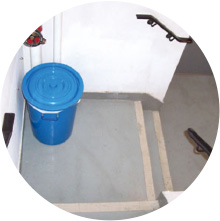
Waste collection bin at staircase landing
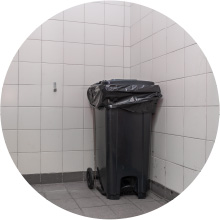
Refuse rooms on individual floor
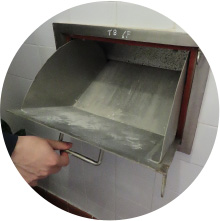
Inlet of refuse chute on individual floors
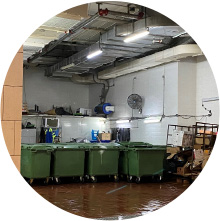
Central refuse collection points
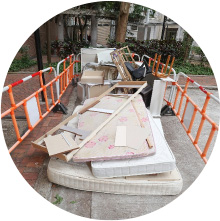
Oversized waste reception areas
In brief, non-compliant waste means waste that is neither wrapped in a designated bag nor affixed with a designated label under "charging by designated bags/ designated labels".
For example, when a designated bag is used to dispose of waste, the waste concerned may be deemed as non-compliant waste if the bag is not tightly fastened, or if the waste is allowed to pierce through the bag.
Photos of compliant waste
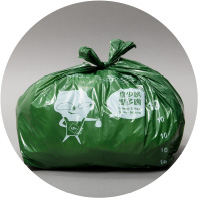
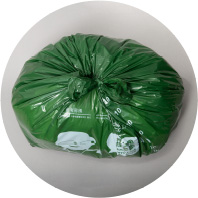
Samples of non-compliant waste
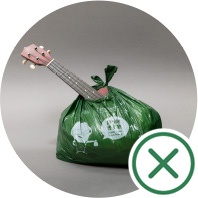
Part of the waste
protrudes from the
opening of the bag
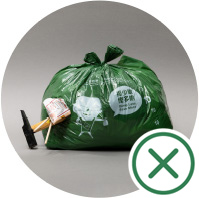
Waste is allowed
to pierce through
the bag
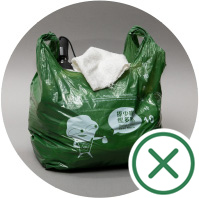
the bag is
not tightly fastened
Besides, any oversized waste (for example large furniture such as dining tables, bookshelves or mattresses) that cannot be properly wrapped in a designated bag will be considered a non-compliant waste if it is not affixed with a designated label when being disposed of.
Designated bags and designated labels are available for sale at a few thousands of authorised retail outlets, including supermarkets, convenience stores, pharmacies, and online platforms, etc.

Click here to visit the authorised retail outlets and online platforms.
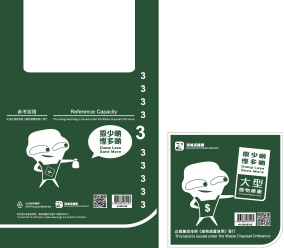
Designated bags and designated labels will only be sold at the authorised retail outlets. Members of the public should purchase designated bags and designated labels at authorised retail outlets or online platforms.
The EPD has published notice in the Gazette to stipulate the specifications for designated bag/ label, including their sizes, shapes, designs and materials for easy reference by the public on their authenticity. Each designated bag and designated label comes with anti-counterfeit features.

For disposal of oversized waste which cannot be properly wrapped into a designated bag, if it is collected by the FEHD (including its contractors); or collected by private waste collectors (PWCs) using refuse collection vehicles (RCVs) with rear compactors, it should be affixed with a designated label. The price of designated label is set at $11 each. Designated labels can be purchased at authorised retail outlets.

If the oversized waste is collected by PWCs using RCVs without rear compactors, it will be charged by weight through "gate-fee" and it is not required to be affixed with a designated label; otherwise it would lead to double payment.
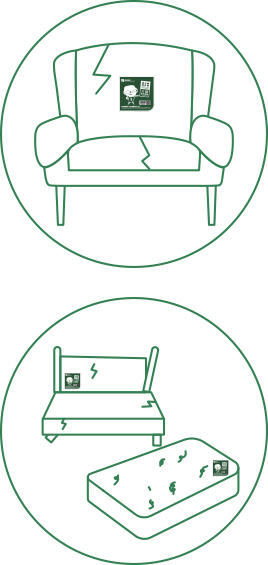
In determining the number of designated labels required, members of public should consider the properties of the oversized waste, including its structure, functions, design, overall size, and quantity, before deciding whether such oversized waste should be considered as one or several articles. The Government will take into account of the above factors and adopt a common-sense approach when deciding whether irregularities are involved.
For example, subject to the actual facts and circumstances, the dismantled parts of the same abandoned furniture firmly tied together by a rope is likely to be regarded as one article of waste requiring one designated label for disposal. However, in case of a table and some chairs, or a bed and a mattress, they are likely to be regarded as separate articles even being tied together, and one designated label is required for each article for disposal.
In addition, multiple bags of household waste tightly bound together cannot be regarded as one article based on their nature. Therefore, such household waste should be properly wrapped in several designated bags but not just affixed with a designated label.
Any person who contravenes or causes others to contravene the above-mentioned requirements of the relevant legislation on MSW charging will be subject to a fixed penalty of $1,500 under the Fixed Penalty (Public Cleanliness and Obstruction) Ordinance (Cap. 570). Prosecution by way of summons may also be brought against serious or repeated offenders.
First conviction
A maximum fine of $25,000 and imprisonment for six months
Subsequent conviction
A maximum fine of $50,000 and imprisonment for six months
To reduce expenditure on MSW charging, the primary way is to reduce waste at source.
Besides, reusing and recycling recyclables through different channels can also reduce expenditure on MSW charging. For example, the public can make good use of the EPD's community recycling network GREEN@COMMUNITY and deliver the sorted recyclables to these recycling points and practice recycling proactively in our daily lives.
Please visit Hong Kong Waste Reduction Website for more latest information on waste reduction and recycling.
![]() Try out the Waste Reduction Calculator to calculate the monthly expenditure on MSW charging
Try out the Waste Reduction Calculator to calculate the monthly expenditure on MSW charging
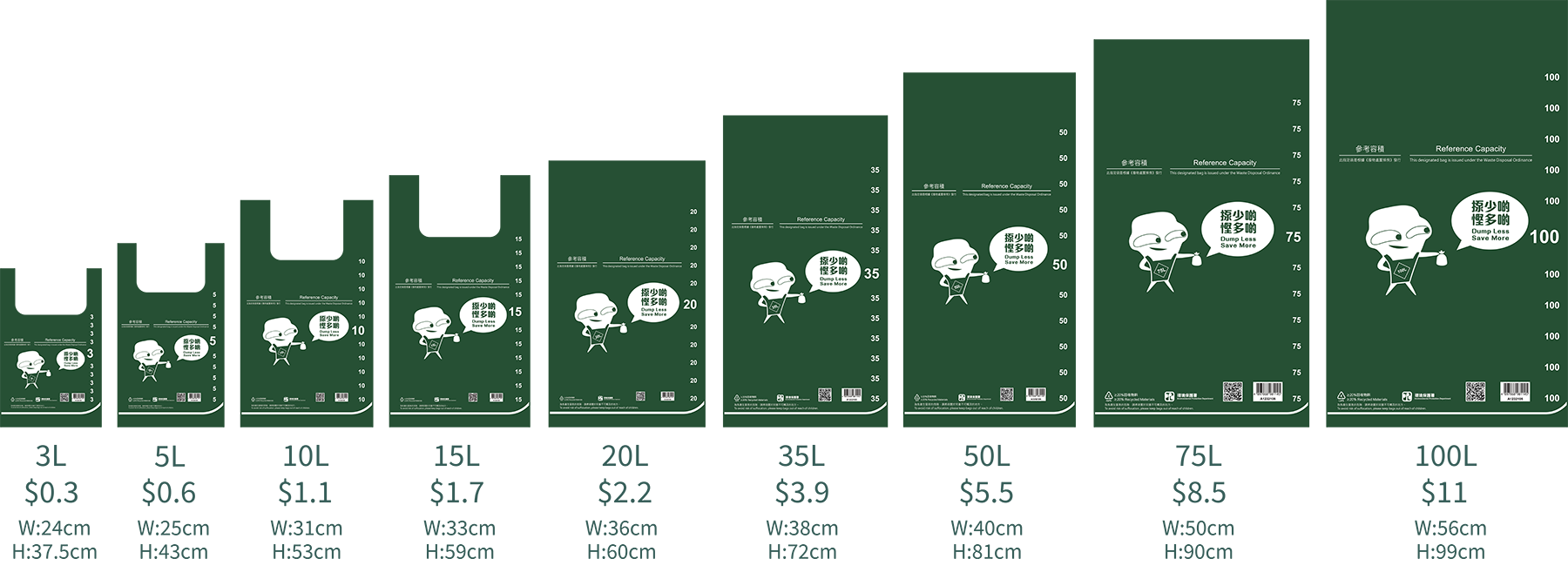
The way to dump the waste is similar to what we are doing now. Currently, we wrap our waste in garbage bags and dispose of it at the communal waste reception areas in the building, housing estate, or the district's collection area. When MSW charging starts, we must buy Designated Bags to replace garbage bags before dumping. For oversized waste, such as furniture, you need to affix a Designated Label to the furniture before dumping it at places such as refuse collection points.
You don't need to. But remember, we should not dump our household waste in roadside litter containers. Dumping household waste at the side or on top of litter containers placed in public places is against the existing law and is subject to a $3,000 fine.
No, the law requires households to be responsible for their waste with the Designated Bags. In most places, waste collectors will refuse to collect waste that contains garbage not wrapped in Designated Bags. In this case, the burden will be on the property management companies. They must wrap the non-compliant waste in Designated Bags before handing it to the collector. It is not a covering action and does not change the requirement and responsibility of individuals using Designated Bags. Just like people should not dump waste illegally simply because shopping malls and housing estates hire cleaner workers to clean up the leftover garbage.
The overall cost will be increased if the housing estate's residents do not unanimously agree on using Designated Bags. Just like the above example that the shopping mall or housing estate will need more cleaning workers and expenses if more residents ruthlessly dump waste. For example, suppose there is waste among the bulk of garbage not wrapped in Designated Bags. In that case, the property management company must use the large Designated Bag to wrap the bulk waste before handing it to the waste collector. It will increase the workforce and costs. Thus, the best way is for all residents to use Designated bags to save property management from spending extra time, effort, and costs to rectify the non-compliant waste.
The most direct way is recycling, such as separating and putting cardboard paper, plastic bottles, plastic bags, plastic boxes, metal cans and glass bottles in the recycling bins of the housing estate or taking them to the Green@Community and recycling spots. These recyclables, which do not need to be wrapped in Designated Bags, help save a lot of money. If there is a food waste collection bin or collection point in your estate, bring your food waste there to save money from buying Designated Bags.
Everyone should be responsible for the waste they generate. Wrapping the waste in Designated Bag before disposal is a basic requirement under the legislation and you should not wait for others to do it. If the residents of the housing estate wait for others to do it first, the property management/ cleansing contractors will always need to clean up the mess and the overall cost will never be reduced. A 15L Designated Bag costs $1.7, while violators could be fined $1,500, which is a few years’ worth of designated bag expenses.
This is illegal dumping and is prohibited at any time or under any circumstances. Violators could be fined $3,000, which is a few years’ worth of Designated Bag expenses. Illegal disposal of large amount of waste in public places may also subject to a fixed penalty of $6,000.
The phasing-in period serves to allow members of the public to get used to buying and using Designated Bags and Labels for waste disposal. The Government will not tolerate any illegal dumping of waste in public places at any time or under any circumstances.
The experience of other cities/countries that have implemented MSW charging shows that it takes several years to cultivate a new waste reduction and recycling culture in the society. As individuals, we can start with ourselves and encourage our relatives, friends and people around us to use Designated Bags and Labels for waste disposal, and then separate the recyclables from waste and practice clean recycling. A waste reduction and recycling atmosphere will be created when more and more people change their behaviour, allowing Hong Kong to catch up with other cities, and also facilitate our ecological civilisation.
Yes, you can. The legislation only prohibits people from providing Designated Bags/ Labels for free in a profit-seeking business.
The experience of other cities/countries that have implemented MSW charging shows that it takes time for everyone to understand and adapt to the new legislation. The most important thing is for everyone to practice it themselves before spreading the mission. If you find someone not using Designated Bags for waste disposal, you can remind them in a friendly manner, but there is no need to be angry and blame each other. We should lead our city forward in a positive and concerted manner, establish a new culture of waste reduction, recycling and green living, and build our ecological civilisation together. If members of the public see someone regularly disposing of non-compliant waste, they can report it to the EPD for follow-up action.
MSW charging is levied in two modes, namely: (i) charging by pre-paid designated bags ("charging by designated bags"); and (ii) charging by weight-based "gate-fee" at refuse transfer stations or landfills ("charging by weight"). The applicable charging mode depends on the waste collection services used by the premises. Click here for details.
Charging by weight is applicable to premises which hire private waste collectors(PWCs)' refuse collection vehicles (RCVs) without rear compactors (such as grab lorries, or hook-lift trucks delivering refuse skips/compactor skips) for collecting waste. As waste in commercial and industrial (C&I) premises is often unable to be fitted in designated bags or unsuitable to be collected by RCVs with rear compactors, charging by weight is generally applicable to C&I premises. On the other hand, charging by weight is not commonly applicable to the daily domestic waste in residential premises. There are, however, certain cases where due to site constraints or other special circumstances (such as waste being deposited into a refuse skip through the refuse chute), the daily waste from the residential premises is collected by PWCs' RCVs without rear compactors. As such, after implementation of MSW charging, such waste will be charged by weight-based "gate-fee". The relevant fee will be apportioned among the flat owners. To avoid double charging, households are not required to use designated bags to dispose of waste. To allow the households of such premises to fulfill the "polluter pays" principle, we have provided recommendations on "gate-fee" apportionment mechanisms in the Best Practice Guide for Residential Premises with Property Management Organisations for the reference of property management companies.
The design principle of the MSW Charging Scheme allows users to continue using the existing waste collection system without major changes. Therefore, these residential premises can continue to hire PWCs' RCVs without rear compactors to transport daily household waste and adopt charging by weight. It is not required to switch to RCVs with rear compactors.
As for oversized waste in residential premises (such as dining tables, bookshelves or mattresses, etc.), if transported by PWCs' RCVs without rear compactors (such as grab lorries), it will also be subject to charging by weight.
The EPD has rolled out a number of waste reduction and recycling schemes to enhance the community recycling network progressively, thereby facilitating the public practise waste reduction at source. Among these schemes include the Programme on Source Separation of Waste, under which free waste separation bins have been provided to over 2 700 housing estates/residential buildings and 1 200 commercial and industrial buildings, and 1 100 sets of kerb-side recycling bins have also been provided in rural areas for recycling plastics, waste paper and metals. Besides, the EPD is continuously expanding the community recycling network GREEN@COMMUNITY. As at March 2024, there have been about 220 public collection points, including 11 Recycling Stations emphasising on both environmental education and recycling support, 77 Recycling Stores located in close proximity to clusters of single-block buildings or set up in PRH estates and over 130 Recycling Spots operating weekly at fixed time and locations, for the collection of 9 common types of recyclables (including waste paper, metals, regulated electrical equipment and those lacking commercial recycling value, such as glass containers, plastics, small electrical appliances, fluorescent lamps, rechargeable batteries and beverage cartons) to specifically support residents living in clusters of residential buildings (including single-block residential buildings and “three-nil” buildings) that are lacking the space for setting up recycling facilities on their own to participate in separation at source and clean recycling. The first Recycling Store in an MTR station, GREEN@TSING YI, has just commenced service in February 2024, and the twelfth Recycling Station, GREEN@WONG TAI SIN, is also expected to provide services in the fourth quarter of 2024. Additionally, the EPD is progressively setting up small-scale Recycling Stores in 50 PRH estates to facilitate residents living in the PRH estates and nearby to practise clean recycling. 15 of these Recycling Stores have already commenced operation, and the other 30 will come into service gradually from the second quarter of 2024 after completion of renovation works. In the meantime, the EPD has arranged for the relevant operators to set up temporary collection booths (operating from 10 am to 8 pm on Mondays to Sundays) in those PRH estates by 1 March 2024 until the corresponding Recycling Stores come into operation, with a view to achieving seamless transition.
At present, GREEN@COMMUNITY also supports collection-at-door service for the aforementioned 9 types of common recyclables to a total of about 200 PRH estates and over 1 800 private housing estates/single-block buildings/villages/etc. A total of 76 sets of smart recycling bins have also been set up at various application points including Recycling Stations, Recycling Stores, PRH estates, private housing estates, villages, shopping malls, tertiary institutions, government premises, etc. for trial use by the public under the Pilot Programme on Smart Recycling Systems.
The recycling network formed by the aforementioned programmes has covered over 80% of the population in various districts of Hong Kong. Besides, to encourage more members of the public to participate in waste separation for recycling, the EPD launched the GREEN$ Electronic Participating Incentive Scheme in 2020, and there are over 500 000 registered users as at the end of February 2024. When carrying out recycling at GREEN@COMMINITY or through smart recycling bins, members of the public can earn GREEN$ points for redemption of gift items or daily necessities.
Currently, all Recycling Stores are basically open from 9 am to 7 pm all year round, including Sundays and public holidays (except for the Lunar New Year’s Eve to the third day of the Lunar New Year, the New Year’s Eve, the Mid-Autumn Festival, the Winter Solstice and the Christmas holidays, which are subject to special arrangements). In response to the service demand of the public, the EPD has adjusted the operating hours of most of the Recycling Stores in PRH estates (including the temporary collection booths mentioned above) to 10 am to 8 pm. The EPD will keep reviewing the operation of all community recycling facilities and the specific needs of individual district for recycling facilities, and will proactively explore various measures such as increasing the number of Recycling Spots near public markets and “three-nil” buildings and extending the service hours, etc. We anticipate that the number of public collection points across the territory will increase to about 500 in August 2024, so as to enhance the community recycling network to help the public practise waste separation and recycling properly.
The EPD is actively implementing various food waste collection initiatives, including support on the collection of food waste from commercial and industrial sources and households. Currently, there are approximately 900 collection points across the territory, including food factories, public markets, cooked food centres, wholesale markets, hospitals, government facilities, tertiary institutions, school lunchbox suppliers, hotels, shopping malls, restaurants, and residential estates, etc.
For PRH estates, the EPD will complete the installation of more than 700 Food Waste Smart Recycling Bins (FWSRBs) in 213 PRH estates across the territory by August this year. For private residential buildings, EPD has been supporting the installation of FWSRBs in private residential buildings and rural village through the Recycling Fund and the Environment and Conservation Fund. Besides, private housing estates with a total household number of no less than 1 000 units can also participate the “Pilot Scheme on Food Waste Smart Recycling Bins in Private Housing Estates” to apply for the installation and relevant maintenance services for the FWSRBs, for a period of two years free of charge. In addition to FWSRBs, the EPD also provides traditional covered food waste recycling bins for food waste collection in private residential buildings through the “Pilot Scheme on Food Waste Collection”.
As for residential buildings without sufficient space to install FWSRBs, the EPD set up FWSRBs at three Recycling Stations in the vicinity of residential areas, namely GREEN@SHAM SHUI PO, GREEN@EASTERN, and GREEN@SAI KUNG to conduct trial domestic food waste collection from the neighbourhood at public collection points, and it will be extended to GREEN@SHATIN in April The first public collection point to be set up at the wet market of the Food and Environmental Hygiene Department (FEHD) has also commenced at Lockhart Road Wet Market as a trial in April. Also, the EPD has set up “Recycling Spots” near village houses or single-block residential buildings, and clusters of restaurants in Sha Tin District to collect food waste generated from nearby domestic households and food premises concurrently in the form of kerbside collection booths at fixed time and locations. In March to April 2024, we have also set up 55 night-time Recycling Spots in various districts to provide more convenient recycling outlets for the public.
To facilitate the recycling of food waste produced by street-level restaurants, the EPD is progressively setting up food waste collection points at refuse collection points (RCPs) under the FEHD. It is anticipated that the number of collection points will increase to nearly 100 in the second quarter of 2024. Both eateries and the public can recycle food waste at the collection points. In addition, the EPD has set up mobile booths or used trucks at locations concentrated with restaurants to collect food waste from “food and beverage clusters” in fifteen districts.
The EPD will continue to set up more public food waste collection points at other suitable premises.
Contact Us
+852 2838 3111

